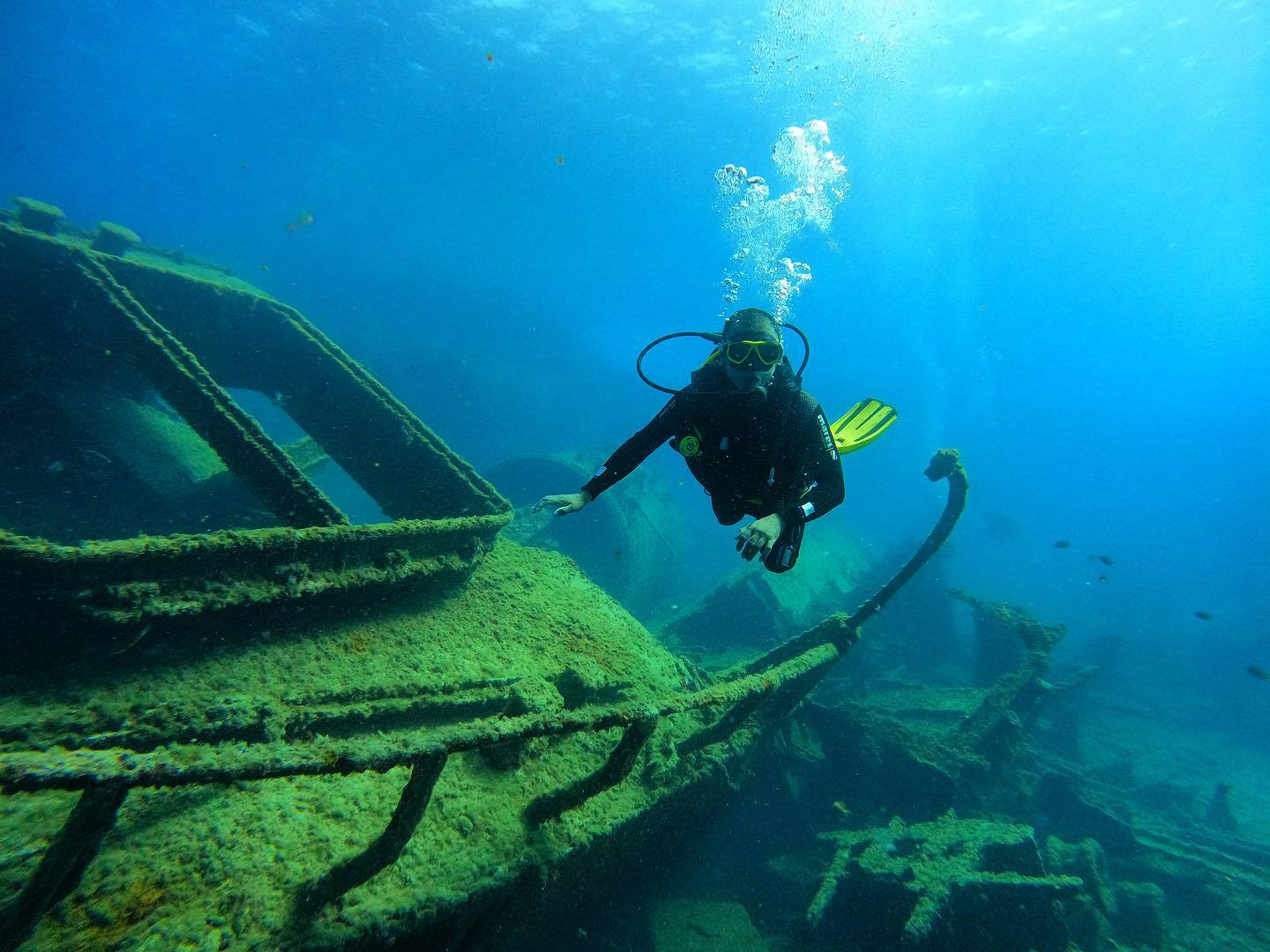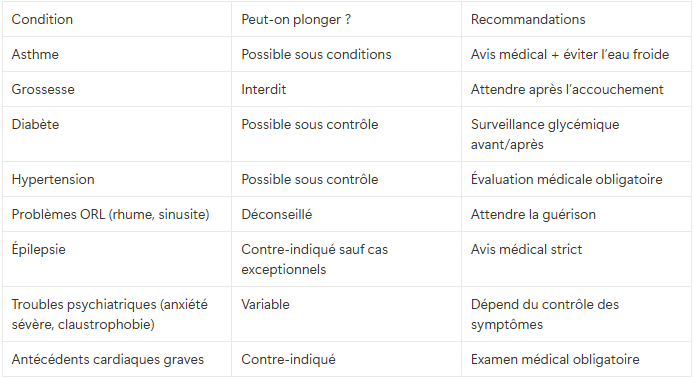Can I dive? Contraindications and advice

Wondering whether you can dive?
- Yes, if: you are in good health and follow the precautions.
- Be careful if: you have asthma, diabetes or are pregnant (see contraindications).
- Why try scuba diving? Diving is a unique experience that immerses you in a fascinating world.
Read on to find out if scuba diving is for you!
Can I dive? Contraindications and advice
Scuba diving is a fascinating experience that allows you to explore a unique aquatic world, a world of wonder and thrills. The immensity of the blue, the underwater silence and the encounters with marine life offer an unrivalled sense of freedom. However, before jumping into the water, it's essential to make sure you meet the necessary health and safety criteria. Am I fit to dive? What are the contraindications?
At Manawa, we're passionate about outdoor activities and want to help you enjoy diving in the best possible conditions. This article will guide you through the physical, medical and skill requirements for a safe diving experience. Don't forget that only a health professional can validate your fitness to take part in this activity.
But beyond the necessary precautions, it's important not to forget that diving is an incredible source of benefits: it encourages relaxation, connection with nature, exploration and self-improvement. So, if you get the chance, don't hesitate to dive into this extraordinary adventure!
Physical conditions required for diving
What is the minimum age for diving?
The minimum age for a first dive varies according to the organisation:
- PADI and FFESSM recommend a first baptism from the age of 8 with parental consent.
- Some clubs accept children from the age of 6. Check with the club for specific details.
Can I dive if I'm a senior?
There is no maximum age for diving. However, good physical and mental condition is essential. A medical check-up is strongly recommended for senior citizens, to avoid any risks related to cardiovascular disease or mobility.
Can I dive if I'm not sporty?
Scuba diving is an activity accessible to all, but requires a minimum level of physical fitness:
- Be comfortable in the water and know how to swim.
- Be able to carry and manage your equipment underwater.
- Be able to tackle weak currents if necessary. If you're a beginner, why not try a baptism for a gradual introduction.
Can I dive if I'm overweight or obese?
Obesity is not an absolute contraindication, but it can accentuate certain risks, such as :
- Cardiovascular problems.
- Reduced respiratory capacity.
- Difficulties managing your equipment.
Tip: Before diving, consult a doctor and choose an accessible dive site.
Medical contraindications to diving
Summary table of contraindications

Can I dive if I have asthma?
Asthma may be compatible with diving under certain conditions:
- Strict medical monitoring.
- Avoid deep dives and cold water.
Consult your doctor to obtain a certificate of fitness to dive.
Can I dive when I'm pregnant?
No, diving is formally not recommended for pregnant women. It can entail risks for the foetus, particularly problems linked to decompression.
Diabetes and diving: compatible?
Well-controlled diabetes may allow diving, provided :
- Maintain a stable blood sugar level before and after diving.
- Inform your instructor.
A medical assessment is essential.
Ear problems (ear infections, perforated eardrums, vertigo)
- Current otitis is an absolute contraindication.
- A perforated eardrum requires the advice of an ENT specialist before diving.
- Dizziness linked to ENT disorders must be medically assessed.
Can you dive with a cold or ENT infection?
No, we strongly advise against diving when you're ill. A blocked nose or sinus infection can prevent your ears from equalising, leading to pain and the risk of barotrauma. Wait until you have fully recovered before diving.
Can I dive if I have epilepsy?
Epilepsy is a major contraindication, with a few rare exceptions:
- No seizures for more than 5 years.
- Complete cessation of treatment and normal neurological tests.
Specialist medical advice is essential before any dive.
Cardiovascular and respiratory problems
Certain cardiovascular diseases prohibit diving, in particular :
- Coronary insufficiency, recent infarction, severe rhythm disorders.
- Uncontrolled hypertension, advanced heart failure.
Asthma may be compatible with diving under certain conditions:
- Strict medical monitoring.
- Avoid deep dives and cold water.
Neurological and psychological disorders
- Epilepsy: Contraindicated in all but exceptional cases (absence of seizures for more than 5 years and cessation of treatment).
- Claustrophobia: Severe claustrophobia can be a problem underwater.
- Depression, anxiety: Depending on the treatment and its impact on alertness.
Medical advice is required before any practice.
Behaviours to avoid before diving
Can you dive after consuming alcohol or drugs?
No! These substances impair concentration and increase the risk of dehydration and discomfort underwater.
Can I fly after diving?
Yes, but there is a time limit before you take the plane:
- 12 hours after a single dive.
- 18 to 24 hours after successive or deep dives. 👉 This delay helps to avoid decompression accidents.
Diving skills
Can you dive without knowing how to swim?
Not recommended. Most clubs require a minimum level of aquatic fluency to guarantee your safety.
Diving and reduced mobility: is it possible?
Yes, as long as you choose a suitable centre with specific equipment and trained instructors.
Can you dive alone?
Not recommended, except for experienced divers with Solo Diver certification. The buddy system is an essential safety rule.
FAQ Scuba diving - Do you still have questions?
Who can't go scuba diving?
People with serious heart problems, uncontrolled epilepsy or who are pregnant should not dive. If in doubt, consult a doctor.
Do I need a medical certificate to dive?
Not always, but it is often requested, especially if there is a pre-existing medical condition.
Can you dive with glasses or contact lenses?
Yes, but we recommend using a mask with corrective lenses or soft contact lenses.
Is there a risk of being attacked by a shark?
No, most sharks are harmless and avoid divers.
Dare to embark on an underwater adventure!
Scuba diving is much more than just an activity: it's a sensory and emotional adventure, an immersion in a world of calm and beauty. Yes, some precautions are necessary, but the benefits of diving far outweigh any constraints:
- A feeling of absolute freedom underwater.
- A connection with nature and marine life.
- A relaxing, soothing experience that reduces stress.
Don't let your doubts hold you back from this incredible experience!
If a contraindication prevents you from diving, try snorkelling, an alternative that's just as immersive!
Ready for your first dive? Book your first dive on Manawa now and dive into the adventure!
🔗 Discover also The best destinations for a first dive
🔗 Want to learn more? Guide to scuba diving